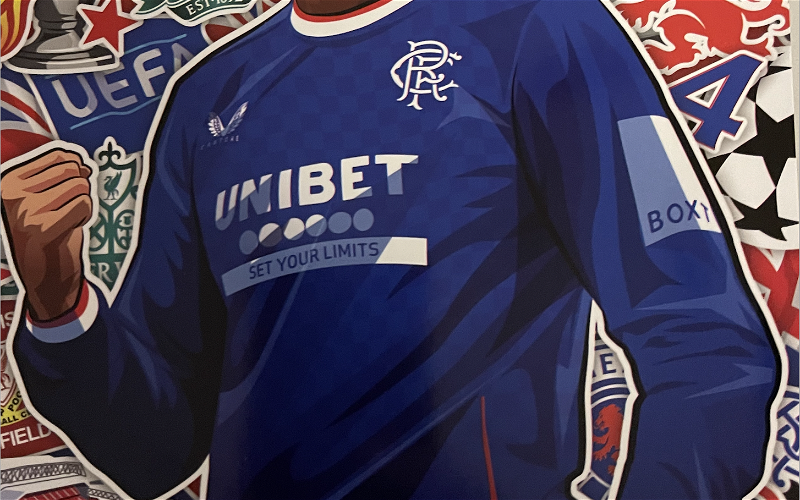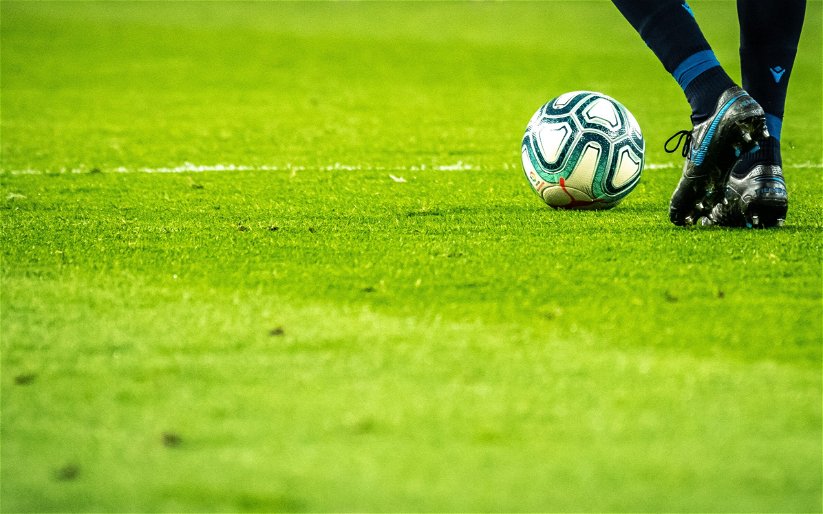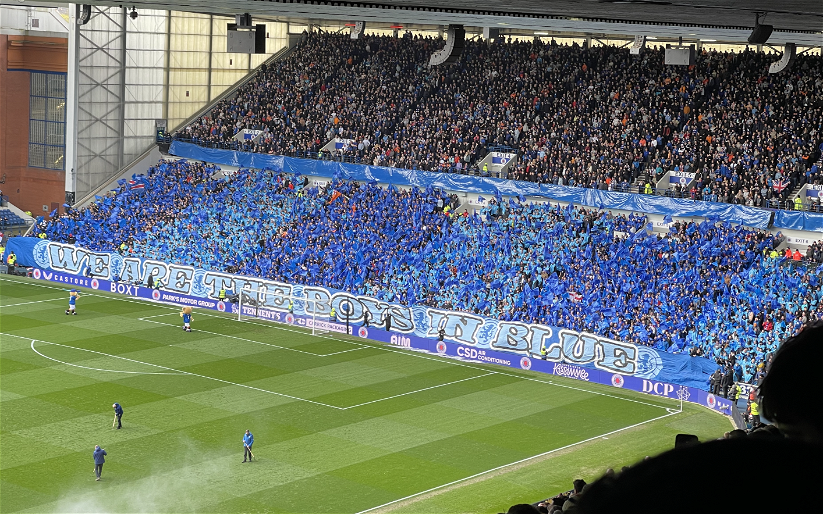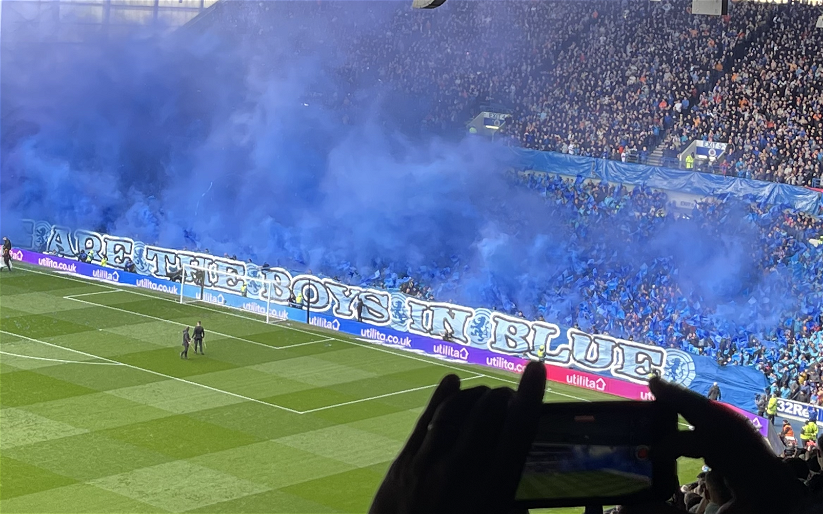By Alistair Aird
Although the squads of Liverpool and Rangers are both multi-national, there’s no escaping the fact that this was another of those matches that sat in the ‘Battle of Britain’ category. And although much has been said and written about the gulf in class and finances, that did little to supress the levels of excitement and anticipation ahead of this one.
Liverpool FC are the fifth English club side to visit Ibrox on European business. The first was Wolverhampton Wanderers in the European Cup Winners’ Cup semi-final in 1961, and they have been followed by Tottenham Hotspur (ECWC, season 1962/63), Leeds (Inter-Cities Fairs Cup, season 1967/68 and European Cup, season 1992/93), Newcastle United (Inter-Cities Fairs Cup, season 1968/69), and Manchester United (Champions League, season 2003/04 and 2009/10). Prior to this one, only Wolves and Leeds United had been beaten, the other matches ending with a couple of 0-0 draws and three defeats. After over 60 years, it was time to buck that trend and the capacity crowd arrived in anticipation of a famous home win.
Rooted to the bottom of Group A and without a goal on the three-match journey from Amsterdam to Anfield, the home support also hoped to see a change in both approach and mindset from Giovanni van Bronckhorst. In the defeats against Ajax, Napoli and Liverpool, Rangers had been passive, lacking the intensity that had reaped so many rewards on the road to Seville. And there was a sense that perhaps too much respect was being afforded to opponents that sat nearer the top end of the European football’s top table than Rangers did.
But Rangers had earned the right to dine with them, and van Bronckhorst’s team selection suggested that on this occasion his side wouldn’t be there simply clear away the dishes. His starting XI only showed one change from the team that comfortably disposed of St Mirren on Saturday. Ryan Kent, rested/dropped at the weekend, was back at the expense of Rabbi Matondo. That suggested a 4-1-4-1 formation, although you felt there was flexibility there for John Lundstram to drop into a back three if required.
Liverpool arrived with some injury concerns and off the back of a 3-2 defeat against Arsenal that pretty much ruled them out of this season’s race for the English Premier League title. They also had the small matter of Manchester City and Erling Haaland coming to Anfield on Sunday. The latter probably explained why Mo Salah was named among the substitutes, while Trent Alexander-Arnold, scorer of a beautifully executed free-kick at Anfield but heavily criticised in the wake of the loss in London, also dropped out of Jurgen Klopp’s side. His place was taken by Joe Gomez who fitted into a 4-3-3 that had Fabio Carvalho and Roberto Firminio either side of the £100 million man, Darwin Nunez.
If van Bronckhorst, his staff and his players had watched the match at the Emirates then Liverpool’s defensive display must have filled them with some hope. While they were excellent as always going forward, they were wide open on too many occasions at the back. Arsenal exploited that, but could Rangers do likewise?
Ahead of the game, Klopp had spoken about how much he was looking forward to sampling the atmosphere in the Ibrox amphitheatre. The Rangers fans ensured he would never forget it. The singing started early and the raucous roaring continued unabated until kick-off. There was also a terrific tifo in the Broomloan Road stand and some pyrotechnics as the teams emerged. It was another of those moments when the hairs on the back of your neck stood up and your spine tingled.
The visitors got the ball rolling and enjoyed a lot of the ball in the early moments. As expected, they were confident and assured in possession, but the Rangers players battled well and a superb long ball from Davies released Kent. The ball eventually found its way to Sakala on the right-hand side of the box, but although the Zambian managed to cut inside, his final shot was easily gathered by Allison. Kent then curled an effort from the edge of the area over the crossbar.
There was hardly time to draw breath as play swung back and forth. But one thing that stood out was that Rangers were certainly not sitting off their opponents. Their press was high, and initial signs were promising. 45% possession and two shots on goal inside the opening quarter of an hour illustrated that point perfectly.
But after 13 minutes Liverpool were almost in. Harvey Elliot, who made his debut for the Reds at the age of 15, was allowed to advance through the heart of the pitch. He dinked a ball over the top for Nunez to chase, but the Uruguayan couldn’t pick out a team-mate.
It was a warning shot across the bows for Rangers, but they seemed unperturbed, and after 17 minutes, Ibrox exploded when Rangers broke their Champions League duck and hit the front. After Tavernier stepped in to turn over possession, Colak touched the ball into the path of Ryan Jack. His pass found Scott Arfield who took the ball in his stride and thumped it beyond the despairing dive of Allison. Moments later, Gomez was short with a passback and Colak almost made him pay. Rangers were relentless.
It wasn’t to last, though, as after 23 minutes it was all square and it was a poor goal to concede. Tsimikas took a corner from the right, and Firmnio got in front of Tavernier to score with a header at the near post. Rangers were now rocking, and after Lundstram had his pocket picked by Firmino, Goldson had to slide in to thwart Nunez on the edge of the box.
The concession of the goal seemed to take the wind out of Rangers’ sails. Passing that had been crisp and precise was now loose and careless. Liverpool had absorbed the blows and responded, but Rangers had shown in the opening 20 minutes that they need not fear their foe. It was now a matter of rediscovering and reviving the attacking lustre that had brought about Arfield’s opening goal.
The home side won a corner after 34 minutes and after Kent worked it short to Barisic, the Croatian’s cross was cleared as far as Tavernier. The skipper pinged a beautiful pass across to Lundstram, but after the boyhood Liverpool supporter burst into the box his cross into a dangerous area couldn’t pick out a blue jersey.
A spell of loose play from both sides ended when Lundstram played a perfect pass forward for Colak. With Kent in space, the crowd rose in anticipation, but the Croatian hurried his pass, and the opportunity was lost.
It was more positive again from Rangers, though, and they should have gone ahead again after 42 minutes. Despite the best attempts of Tsimikas to foul him, Sakala burst forward. His pass for Arfield was perfect, but on this occasion, the Canadian’s left foot shot was blocked by Konate. He should have scored.
There was a blow for Rangers just before the interval when Goldson had to be taken off after he was injured in a tussle with Nunez. He was replaced by Leon King who had impressed many observers at Anfield.
The first half, which had flown by, had shown that maybe Rangers weren’t as far out of their depth at this level as many would have led us to believe. It ended with the home side having 47% possession and six shots on goal. Possession had been surrendered 88 times compared to 92 by Liverpool, while Rangers boasted a passing accuracy of 72% (76% Liverpool).
But if the first 45 suggested that Rangers were starting to keep their heads above the Champions League waterline then the second was a stark contrast. By the end of it they were drowning after being swept away by a tidal wave.
Liverpool came out the traps fast at the start of the second half. Rangers struggled to get a foot on the ball, and after 48 minutes, Lundstram was penalised for a foul on Elliot. It was unnecessary but it went unpunished when Tsimikas scooped the free kick over the bar.
But Rangers sprung to the other end, and Liverpool looked vulnerable again when Tavernier hung up a cross to the far post. Kent won it in the air and the ball almost broke for Jack. Liverpool then made inroads at the other end and Lundstram had to slide in to block a cross from Nunez at the expense of a corner.
It looked we were set for another pulsating half of football. Alas, for the home side it was more punishing as they took a pounding. But as good as Liverpool were, the same unacceptable meek surrender we had seen at Parkhead and in Amsterdam was to the fore once again.
Liverpool took the lead after 55 minutes. It was another simple goal. Joe Gomez was allowed to stroll forward, and his delivery picked out Firminio who slotted in with ease. There was a litany of errors, with Kent not tracking the run of Gomez, Barisic out of position while King wasn’t tight enough on Firminio. Another painful lesson in how mistakes at this level are clinically punished.
With an hour played, a glance at the second half stats illustrated that Liverpool were taking command. They had 67% possession, seven shots on goal, and 95 passes to 47. What the stats also showed was how poor Rangers had become at protecting the ball. Their passing accuracy was 47% compared to 81% for Liverpool.
The atmosphere was now flat. Liverpool had found another gear and were keeping the ball with relative ease. The high intensity press of the first half from Rangers was now conspicuous by its absence. And after 66 minutes it was game over. Not for the first time, Barisic didn’t read the run from Carvalho and when he teed up Nunez, the Uruguayan guided a right foot shot into the far corner. A simple goal in terms of creation and execution but once again preventable from a Rangers perspective.
That would be Nunez’s last action, but his withdrawal did not suggest there would be any respite for Rangers. He was replaced by Mo Salah, and with 15 minutes remaining, while van Bronckhorst prepared a triple change, the Egyptian fired Liverpool were three goals ahead. Arfield gave the ball away in midfield and the ball was played to Salah who beat McGregor from an acute angle. You have to say that once again the goal could have been prevented.
The changes were then made – Wright, Morelos and Matondo for Sakala, Colak and Kent – but the new attacking triumvirate were rarely seen. Instead, it only get worse for Rangers.
Salah scored again with 10 minutes to go to make it 5-1, and then strolled through to complete his hat-trick moments later. It was the fastest ever hat-trick recorded in the history of the Champions League, although for the latter goal, Barisic once again stood back rather than close his man down. Perhaps the time is right now for young Ridvan Yilmaz to get an opportunity at left back.
Liverpool had the ball in the net again with a couple of minutes to go when the impressive Elliot stroked home, but Jota was flagged offside. It would stay at 6-1…..or so it seemed. A VAR check was requested, and the goal was awarded.
The second half stats said it all. Rangers had ONE shot on goal – it came in STOPPAGE TIME – while Liverpool had SEVENTEEN. Thirteen of those shots came from inside the box too. Liverpool had also played 266 passes in comparison to 174 for the home side.
Rangers had now suffered their heaviest home defeat in Europe and shipped seven in a competitive match for the first time since October 1957. After that particular debacle a young centre back called John Valentine never played for the club again. You could understand if a similar fate befell some of the players who had taken part in the humiliating hammering against Liverpool.
Rangers were a battered and beleaguered bunch by the end. For most of the first half it looked like a famous night might be on the cards at Ibrox. But the vim and vigour of the opening half was now a distant memory. Rangers were a shadow of the side that had matched Liverpool for spells in the first half, and in the face of an onslaught most of the players in a blue jersey had once again shrunk. Defeats, even heavy ones, can be tolerated, tossing in the towel will never be.
The Champions League journey is over. One thinks, however, that the post mortem that will follow will last a little while longer.




